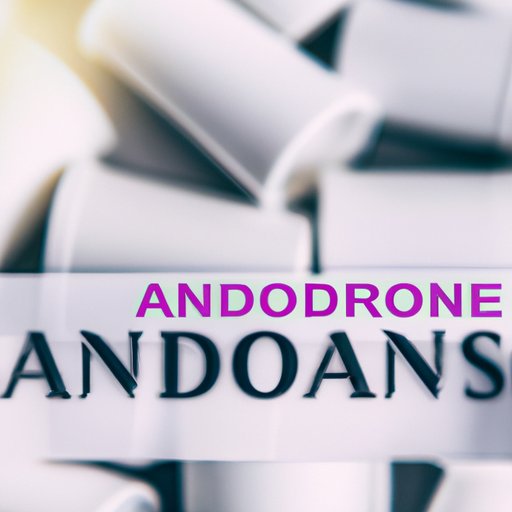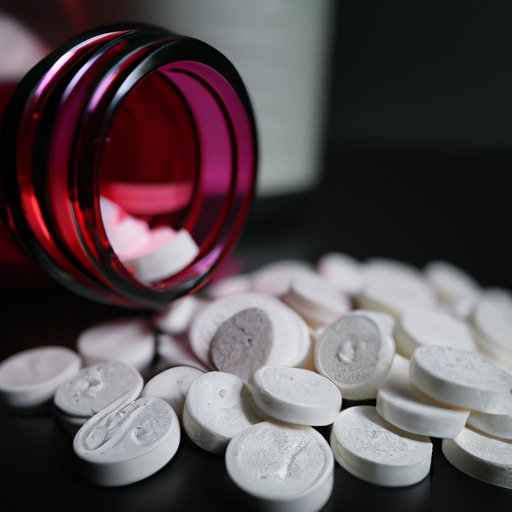
Introduction
Promethazine is a medication that has been in use for over 70 years to treat allergies, nausea, and vomiting. However, it is also becoming increasingly well known for its use as a recreational drug, leading to a growing concern about its potential for abuse and addiction. In this article, we will explore the reality of whether or not Promethazine can get you high, along with its intended use, risks of misuse, dangers of addiction, and treatment options available for those who need help.
The Truth About Promethazine: Separating Fact from Fiction
Promethazine is a medication that is typically used to treat symptoms related to allergies, nausea, and vomiting. However, it is also sometimes used off-label for other purposes because of its side effect of causing drowsiness and relaxation. This has led to some misconceptions about what the medication is and what it can do.
Despite popular belief, Promethazine is not an opioid. It is a sedative antihistamine that works by blocking histamine, a natural substance produced by the body that causes allergy symptoms such as itching, runny nose, and sneezing. While it can cause drowsiness, it is not designed to produce a “high” like opioid drugs can.
The Dangers of Promethazine Abuse: What You Need to Know
Abusing Promethazine can lead to a variety of serious health risks. Most commonly, people who use it recreationally do so in combination with other drugs, such as opioids or alcohol, in order to enhance the effects. This can lead to unpredictable and dangerous reactions, including respiratory depression, coma, and death.
Additionally, long-term misuse of Promethazine can lead to a number of health problems, including liver damage, kidney damage, chronic respiratory problems, and even brain damage. It can also result in addiction, which can be difficult to overcome without professional help.
How Promethazine Abuse Can Lead to Addiction and Other Health Risks
Like any drug, Promethazine has the potential to be addictive. When used recreationally, it can lead to physical dependence and withdrawal symptoms, including insomnia, anxiety, and seizures. It can also lead to psychological dependence, making it difficult for individuals to stop using the drug even when they know it is causing harm to their health and well-being.
In addition, chronic recreational use of Promethazine can lead to long-term damage to both the body and mind. Physical effects can include respiratory issues, liver and kidney damage, cardiovascular issues, and gastrointestinal problems. It can also cause depression, anxiety, and other mental health issues, leading to a decline in overall quality of life.

Promethazine and the Opioid Epidemic: A Deadly Combination
Promethazine has been identified as a gateway drug to opioid abuse. By itself, Promethazine does not produce a “high” like opioids can, but it is often used in combination with other drugs, such as codeine, to enhance the euphoric effects. This can lead to a dangerous cycle of addiction, in which individuals may begin using more potent opioids such as heroin or fentanyl in order to achieve the same heightened effects.
Combining Promethazine with opioids is extremely dangerous, as it can increase the risk of respiratory depression and death. It is important to understand that recreational use of Promethazine or any drug can have serious consequences, including death.
Breaking the Cycle of Recreational Promethazine Use
Breaking the cycle of Promethazine abuse and addiction is possible with the right combination of treatment and support. There are several types of addiction treatment available, including inpatient and outpatient rehab, therapy, and support groups. It is important to talk to a medical professional, detox specialist, or addiction specialist to determine which type of treatment is best for each individual’s unique situation.
In addition to seeking professional help, there are practical ways to quit recreational Promethazine use. These include getting rid of any remaining pills, avoiding situations or people that may trigger drug use, and finding healthy outlets for stress relief, such as exercise or meditation.
Understanding the Effects of Promethazine on the Body and Mind
Like any drug, Promethazine can have both short-term and long-term effects on the body and mind. In addition to its intended use as an allergy and nausea medication, Promethazine can cause drowsiness, sedation, and relaxation.
The short-term physical effects of Promethazine can include dizziness, drowsiness, dry mouth, and blurred vision. Long-term use can lead to liver and kidney damage, respiratory problems, and cardiovascular issues.
The psychological effects of Promethazine can include depression, anxiety, and other mental health issues. These can be caused by the effects of the medication itself or by the stresses related to addiction and drug use.
Promethazine: A Medication Meant for Relief, Not Recreation
Promethazine is a medication that is designed to provide relief from allergy symptoms, nausea, and vomiting. It is not intended for recreational use or to produce a “high.” Misusing it can have serious consequences, including addiction, health problems, and even death.
It is important to use Promethazine only as directed by a medical professional, and to seek medical attention immediately if any adverse reactions or side effects occur.
Conclusion
Promethazine may have some relaxing and sedative effects, but it is not designed to produce a “high” like other drugs such as opioids. Abusing Promethazine can lead to dangerous health risks and addiction. However, it is possible to break the cycle of abuse with the help of professional treatment and support. It is important to seek help if you or someone you know is struggling with Promethazine abuse or addiction.





